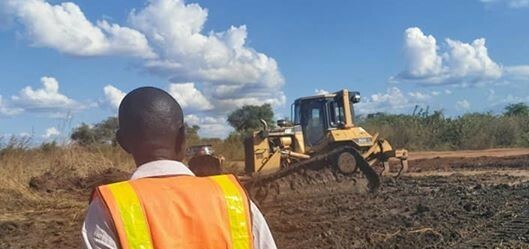The construction of the Juba-Nadapal road has come to an abrupt halt due to a lack of funding, a government official has said.
The road project, spanning 365 kilometres and passing through Torit to Kapoeta, was expected to connect with Nadapal at the Kenyan border. The construction was initially scheduled to be completed within four years, but the shortage of funds has brought the project to a standstill.
Work on the road was commenced in August 2020 by the lead contractor, the African Resources Corporation (ARC).
The road project, which is an international corridor linking the hinterland of South Sudan with markets in Kenya and international markets through the port of Mombasa, was estimated to cost $29 billion.
Speaking to Radio Tamazuj on Monday, Jildo Abala Remy, the Eastern Equatoria State Minister for Roads and Bridges, said: “Initially, the construction crews were progressing well with their work, but they have encountered a shortage of funding.
“At present, there is no indication of the availability of funds, causing the work to come to a halt. The main challenge lies in the construction of bridges, which remain untouched. These unfinished bridges pose a significant risk to road users, potentially leading to accidents,” he added.
When asked about the allocation of oil revenue for infrastructure development in South Sudan, the minister, who is a member of the opposition SPLM-IO, expressed uncertainty.
Remy admitted, “Even those of us directly involved in these road projects do not have a clear understanding of what happened with the oil revenue. We are unaware of the answers regarding the utilization of oil funds.”
In light of the situation, the State Minister requested the national Ministry of Roads and Bridges to take immediate action by sending its staff to address the unfinished road and bridge construction.
Meanwhile, Ikodio Christine, a female activist from the Women with Impairment Organization (WWIO) in Torit, emphasized the need for the government to prioritize the Juba-Nadapal highway to safeguard the country’s economy.
Christine raised concerns, stating, “It is perplexing that the governor and president have not addressed the sudden halt in the construction of this road, while other roads such as Juba-Bor and Juba-Aweil are progressing. Was the Chinese (crude for road project) funding allocated exclusively to specific regions, or was it intended to be distributed evenly? Eastern Equatoria State, given its numerous borders with East African countries, should have been a priority for road construction. The escalating prices of commodities are evidence of the difficulties faced in exporting and importing via road. If the Juba-Torit-Nadapal road had been constructed, our situation would be vastly improved.”
The female activist believes that the completion of the Juba-Torit-Nadapal highway will stimulate trade and act as a catalyst for development.
In response to the situation, Grace Abalang, an SPLM lawmaker at the South Sudan National Legislative Assembly, announced that Eastern Equatoria State parliamentarians in Juba will summon the National Minister of Roads and Transport to address the reasons behind the highway’s suspension. The parliament intends to discuss the budget over a period of 40 days before calling upon the minister.
Expressing her dismay at the lack of commitment to complete the highway, Abalang highlighted the challenges that Eastern Equatoria State faced during the liberation struggle.
She stated, “Why is the road construction not progressing? Our bridges have been washed away, and heavy rains can render the road impassable. We urge the national Ministry of Roads to allocate funds for our road, as it is of strategic importance. This highway will bring essential services and bolster our economy.”
As the legislator representing Eastern Equatoria State, Abalang emphasized the region’s contributions to the liberation struggle and the significance of the highway for their people.
She called on the government of South Sudan to allocate a portion of the oil revenue to fund the road, considering the substantial non-oil revenue generated by Eastern Equatoria State through the Nimule border.




